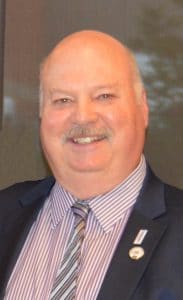SMART TD Ohio State Legislative Director Stu Gardner continued his discussion with The Union Edge: Labor’s Talk Radio on why we need two-person crews. The show aired Tuesday, Aug. 22.
Click play below to listen.
Tag: two-person crews
Although both the Nevada Senate and House approved S.B. 427 – the state’s two-person crew bill – Republican Governor Brian Sandoval vetoed the measure June 8.
Click here to read Sandoval’s veto letter.
In an interview with Trains.com, E. Hunter Harrison, the new CEO of CSX, recently stated that he is not a fan of one-person crews. Translation: he supports two-person crews. Read the entire interview.
Nevada Senate Bill 427 (S.B. 427), sponsored by Nevada State Senator Mark Manendo (D – Dist. 21), seeks to restore a requirement in Nevada’s laws regarding the minimum number of persons operating freight trains in the state.
The bill comes in response to interest expressed by freight railroad carriers nationwide in reducing the current crew size for most cross-country freight trains from two persons to a single operator. Railroad workers oppose such action, citing what they see as a compromise in safety with regard to further crew size reductions.
“In an incident such as a derailment resulting in the release of hazardous materials, the elimination of a crew member from freight trains would cause delay in notification to emergency responders. That creates an unacceptable risk to the public,” said SMART TD Nevada State Legislative Director Jason Doering.
“The desire to pursue single-person operations of freight trains clearly represents placing cost reduction and profits ahead of responsibility for ensuring that movement of freight by rail through the communities of Nevada takes place in the safest possible manner,” added Matt Parker, chairman of the Nevada state legislative board of the Brotherhood of Locomotive Engineers and Trainmen (BLET).
Nevada law previously specified a minimum crew size for freight trains in the state. The crew size requirement in that law was repealed in 1985 to accommodate changes to collective bargaining agreements negotiated between rail carriers and the labor unions representing their transportation craft employees.
“Had we foreseen the day that rail carriers would seek single-operator crews, we most certainly would not have supported repeal of Nevada’s previous crew consist requirements, instead insisting upon a modification to the law,” said retired UTU Nevada State Legislative Director Rodney Nelms, who participated in the 1985 legislative action.
S.B. 427 passed the Senate Committee on Transportation with a 3-2 vote. You can find the bill here: https://www.leg.state.nv.us/App/NELIS/REL/79th2017/Bill/5505/Overview
A special thanks goes out from Doering to Sen. Manendo for sponsoring S.B. 427. Doering asks that members contact their Nevada state senators and ask them to support S.B. 427. Members can contact their state senators directly by visiting the Nevada State Senate website.
MALAKOFF, Texas – inForney.com reported that 38 Union Pacific (UP) freight cars derailed in this small eastern Texas city on Wednesday, March 29. Authorities said that the diesel spill from two ruptured cars was contained and was not a danger to the public or to local water sources. Click here to read the entire article.
Jan. 3 – SMART Transportation Division submitted comments protesting in-cab distractions to the Federal Railroad Administration (FRA). The FRA recently issued a public notice in docket FRA 2016-0002-N-22, allowing for comments to be made on in-cab distractions.
“We have been concerned about the increase of in-cab distractions for some time and have submitted letters and comments to the FRA with our concerns. Two examples are Trip Optimizer and Leader, which are computer-generated devices located in locomotive cabs that are allegedly being used to save fuel,” SMART TD’s National Legislative Director John Risch said in the comments.
“In addition, PTC implementation is causing greater cab distractions than we had hoped it would. Instead of the PTC system simply stopping trains when necessary, they are constantly messaging the engineer to take some minor corrective action and requiring the engineer to interact immediately, which takes the crews’ focus off the track ahead and on the cab electronic device.”
Click here to read the full comments made by SMART TD to the FRA.


